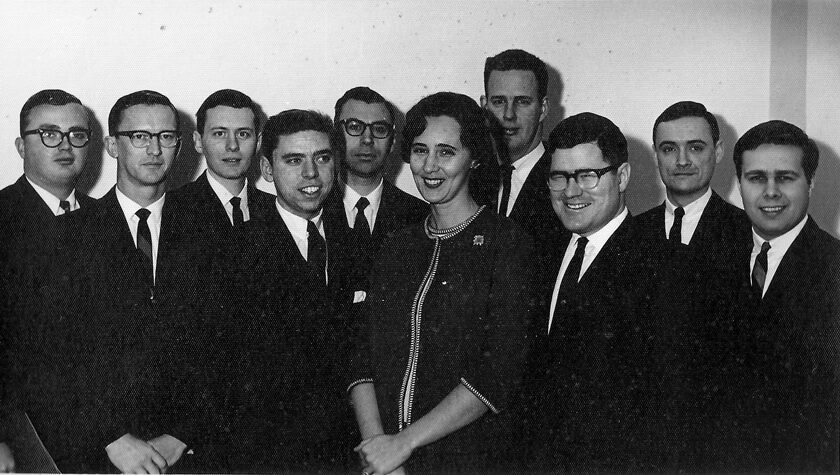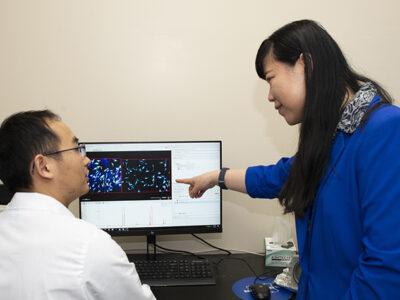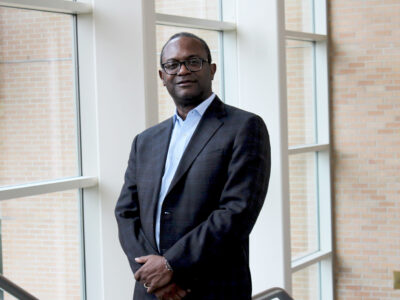
6
June

Drug Action alumni, still connected years later, were inspired to give back
By Katie Ginder-Vogel
“I call us the Lost Boys because no one knew what to do with us,” says Ken Miller (BS ‘64, PhD ‘69).
Miller was one of nine students enrolled in the University of Wisconsin–Madison School of Pharmacy’s pharmacology program during its formative years. The program lives on today as the Pharmaceutical Sciences Division’s Drug Action Core.
Miller and his classmates — Gordon Conard (BS ’61, MS ‘67), Dennis Feller (BS ’63, MS ’66, PhD ‘68), John Page (BS ’63, MS ’66, PhD ‘67), Bob Cavanagh (PhD ’67), Jurgen von Bredow (MS ’66, PhD ’69), Jim Oppermann (BS ’65, MS ’67, PhD ‘70), Al Collins (BS ’65, MS ’67, PhD ’70) and Dave Anderson (MS ’67, PhD ‘71) — may have called themselves “The Lost Boys of Pharmacology,” but they found academic success and fruitful careers, and their story is one of resilience and academic excellence.
Establishing relationships — and successful careers
The Drug Action program was developed by then-Dean Arthur Uhl, in response to the abrupt shutdown of the School of Medicine’s pharmacology program in the 1960s, when the entire department’s faculty members left the university. Professor Kenneth Finger was hired to run the program, but not long after, had had the opportunity to serve as dean of the University of Florida College of Pharmacy. Another shakeup came when Dean Uhl retired, after more than three decades at the School.
But stability came in the form of Professor Coryce Haavik, the group’s advisor during the early years of pharmacology education at the School of Pharmacy.
“I was in my last year, just finishing up my research, when Ken Finger went to Florida,” says Miller. “I was mostly done and working on my thesis. Dr. Haavik really helped me. She reviewed my thesis, made suggestions, and I went back and did one or two more experiments.”
“We’d squeeze eight students and a professor into a station wagon and cram into one of the cheapest motel rooms we could find.” –Al Collins
Despite the tumult, the “boys” rallied together in their new academic home. Most of the pharmacology graduate students were from Wisconsin and knew each other from their undergraduate years at UW–Madison.
“We were a fairly tight group,” says Miller. “We played softball and touch football together, with some of the faculty at the School.” Because they had only one lab in the still-developing program, everyone shared equipment and maintenance responsibilities.
“We got to know one another and helped one another,” recalls Miller.
The tight-knit connections they forged during those years persist, and the group continues to stay in touch. Collins says the group often reminisces about their experiences attending the Federation of American Societies for Experimental Biology meetings in graduate school, and the lengths to which they went to stretch their limited funds.
“We’d squeeze eight students and a professor into a station wagon and cram into one of the cheapest motel rooms we could find,” says Collins. “My last year as a grad student, I went to the meeting and registered for job placement, and after several interviews, I got a job offer from Drake and from the University of Colorado School of Medicine as a postdoctoral scholar in their department of pharmacology.”
Collins chose the postdoc at the University of Colorado. “I think all of us interviewed at Federation meetings, and I bet all of us also got our first job offers as a result,” he says.
Collins ultimately became a professor in the University of Colorado Boulder’s pharmacy school. Miller and Feller also became academics: Miller as a professor at the University of Minnesota College of Pharmacy and ultimately as president and dean of Albany College of Pharmacy, and Feller as a professor at The Ohio State University and then chair of pharmacology at the University of Mississippi College of Pharmacy.
Anderson, Conard, Page, Cavanaugh, and Oppermann entered industry, all achieving top leadership roles at major pharmaceutical companies. Jurgen von Bredow became chief of the Pharmacology Division at Aberdeen Proving Ground, assistant to the director of Experimental Therapeutics at Walter Reed Institute of Research, and then joined the U.S. Food and Drug Administration’s Veterinary Division after retiring from the military in 1993.
In 2003, more than three decades after graduating from the School, Haavik, Conard, and von Bredow organized the first reunion of the Lost Boys at Haavik’s Milwaukee home. Both Collins and Miller describe Haavik, who passed away several years ago, as “the glue” that held the group together over the years.
“Jurgen and Dr. Haavik were close because she helped him a lot in graduate school, and they and Conard decided to see if everyone could get together,” says Miller. “She invited everyone to her house one summer. That’s how it all started. We had such a good time that we kept getting together.”
Their next in a long series of reunions is set for August 2019.
The Lost Boys give back
As academics, both Miller and Collins were continually aware of the value of travel for graduate students, and all the Lost Boys fondly remember their pivotal trips to conferences as graduate students. When former School of Pharmacy Dean Jeannette Roberts, who retired in 2018, suggested the group consider leaving a legacy with a gift to the School, the group thought creating a travel fund was an excellent opportunity to give current and future students a leg up.
“As a longtime faculty member at CU Boulder, my biggest challenge was coming up with travel funds, particularly for grad students, and I feel strongly that attendance at national and international meetings is extraordinarily important for grad students,” says Collins. “It helps them connect with the people who will be their employers and mentors, and it provides a window into other exciting areas of science not directly related to their own research careers.”
Miller agrees that encouraging students to plug themselves into national networks of researchers at conferences is important, especially early in their careers.
“There usually isn’t a lot of money for that, so we knew that we wanted our fund to be student-focused,” he says.
After jokingly tossing around the idea of giving the School a “Lost Boys Memorial pH Meter,” the group decided a travel award — the Pharmacology Graduate Student Travel Award in Drug Action — was the right idea.
“Reflecting on our experiences, we became devoted to the idea of using our money to help young folks in grad school today reap the benefits of going to scientific meetings,” says Collins.
“Supporting higher education is a priority for my wife and me. We both feel UW–Madison changed our lives.” –Ken Miller
Graduate students Christopher Unterberger and Qinying Yu, the 2018 recipients of the travel award, can say for certain that the funds have done what they’re meant to: help further their careers.
For example, the funds made it possible for Unterberger, who researches in the lab of Professor Paul Marker, associate dean for research and vice chair of the Pharmaceutical Sciences Division, to attend the Society of Basic Urologic Research’s annual meeting and meet fellow researchers, learn from well-established scientists, and present his research to colleagues.
“The Drug Action Pharmacology Graduate Student Award gave me the opportunity to experience my first research conference in the field,” says Unterberger. “I am truly grateful for this opportunity.”
Yu works in Pharmaceutical Sciences Division Professor and Charles Melbourne Johnson Distinguished Chair Lingjun Li’s group, focusing on mass spectrometry-based glycan quantification and identification, and is using the funds to attend the American Society of Mass Spectrometry’s annual conference in June, where she will present a poster entitled, “A Novel Isobaric Tag Enabled Multiplexed Quantitative Glycomics Analysis for Various Types of N-glycans, including Sialic Acid Linkage Isomers.”
“This award greatly encourages graduate students to reach out, present their research, and communicate with different people,” says Yu. “By attending this conference, I’m hoping that I can broaden my horizons and apply more mass spectrometry knowledge to my research in biological sciences.”
When the group reunites again in August 2019, they plan to discuss the travel fund and will explore new funding opportunities to honor the members of the group who have passed away: Coryce Haavik, Bob Cavanaugh, John Page, Gordon Conard, and Jurgen von Bredow.
“Time goes on, and you find yourself looking for good causes to give to,” says Collins. “The loss of our friends and colleagues is sobering.”
Collins and Miller continue to look forward for ways to continue to give to students in their field.
“Supporting higher education is a priority for my wife and me,” says Miller. “We both feel UW–Madison changed our lives.”
Learn the story of another travel award created to honor an alumnus: Alfred W. Grube.




